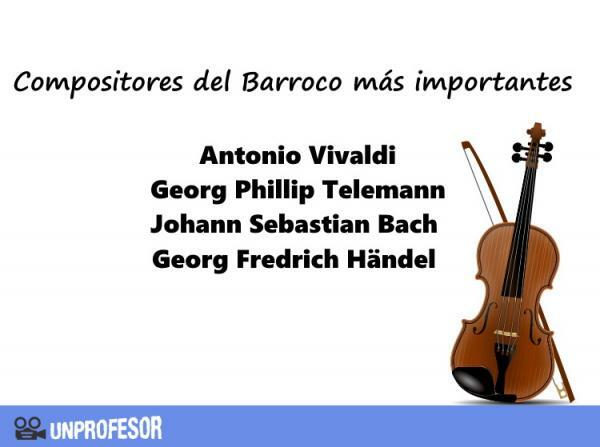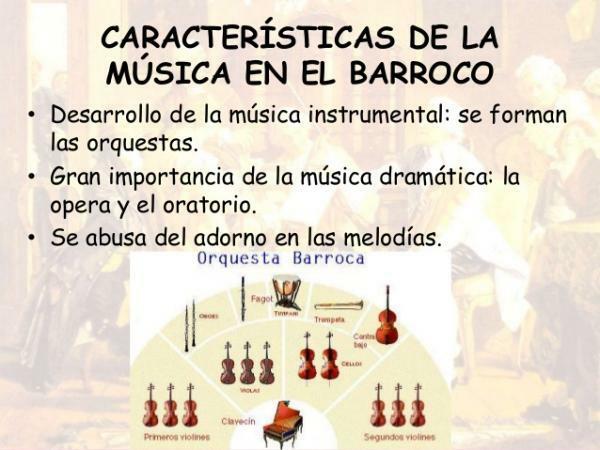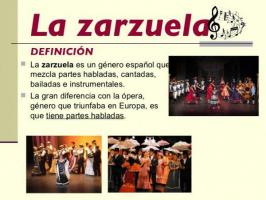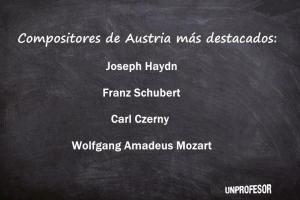The most outstanding BAROQUE composers

It is said that the human being is the son of his time and that his way of life is linked to the conventions of the history of the moment and the ideas that are around him. Still, there are characters in history who manage to stand out for their creativity, those who manage to take what they know to create new things that push the limits of art.
In this lesson from a TEACHER we will talk about these people, the Baroque composers, a period of pomposity and craftsmanship where some composers managed to take this and turn it into something beautiful that would prevail for centuries to come.
The music in the Baroque occurs in Europe during the s. XVII, some link its beginning with the birth of the opera (year 1600) and mark its end with the death of the composer Johann Sebastian Bach (1750). The baroque happened greatest boom in Italy, Germany, England, France and Spain.
In general, the culture of the moment was based on an appreciation of workmanship, extremes, and contrast. Due to the changes in the religious area, music was used as a means of propagation by the church and the nobility. This is how music comes to be
an element of influence in the public and the musician becomes a servant of the monarchy.It is at this moment in history that the instrumental language of the orchestra, in the wake of the opera. That required performances in large theaters. String instruments predominated, along with the concept of tonality, continuous bass and the clarity of rhythm, time signature and sound contrast.

These are some of the most important Baroque composers:
Claudio Moteverdi (1567 - 1643, Italy)
His music represents the transition between the Renaissance and Baroque periods by changing polyphony and madrigal compositions to the genre of lyrical drama and opera. He is awarded the first opera in history: Orfeo, favola in musica,
Some notable works:L’Arianna, The Fable of Orpheus, The return of Ulysses to the homeland.
Jean-Baptiste Lully (1632 - 1687, Italy / France)
He was also a violinist and a dancer. He is recognized as the one responsible for initiating the forms of opera in France. Thanks to his cunning, he lived under the favor of the monarchy throughout his life, allowing him to remain and influence in the cultural realm. His taste for dance made him get involved in the creation of many works of such a nature as ballet, genre of which he created lyrical tragedy, (a musical form that fuses ballet with French culture) and comedy ballet.
Some notable works:Bellérophon, Isis, The bourgeois gentleman.
Henry Purcell (1659-1695, England)
He is considered one of the most important Baroque composers of all time. He has 861 works in his name, which are characterized by incorporating and / or fusing the English style with French and Italian music. His forms include his sonatas, suites, marches and pieces for harpsichord.
Some notable works:Dido and Aeneas, The Queen of the Fairies.
Antonio Vivaldi (1678 - 1741, Italy)
He was a priest and also a composer: violinist and teacher. Another role that defines Vivaldi is his work as impresario, name given to the person who is dedicated to the organization of musical and theatrical arts, where appropriate: operas and concerts. He stands out for his numerous concerts (400 approximately) and operas (46). A crucial part of his work was to develop the formal and rhythmic structure of the concert as a musical form.
Some notable works:The four seasons, Ercole su’l Thermodon
Georg Phillip Telemann (1681 - 1767, Germany)
Self-taught, music director in 5 different churches. He made so many works that the exact number of his creations is not really known. According to the accreditations, Telemann owns 800 works in his name, but others estimate that it reaches an impressive 3,000. Among Telemann's works, operas, sacred music and chamber music stand out.
Some notable works: 12 fantasies for solo flute, Pimpinone, Germanicus.
Johann Sebastian Bach (1685 - 1750, Germany)
Bach is perhaps one of the most influential musicians of all time, inspiring other great characters like Mozart, Beethoven, Liszt, Wagner and Malher among many others. He is recognized as the master of counterpoint, he was a harpsichordist, organist, violinist, violist and singer. Bach served for the monarchy and always remained involved in the church, as a result most of his works were commissioned, dedicated and performed for God.
Bach is the author of the famous compilation of works for keyboard "The well-tempered harpsichord" from which the principles of the tuning of the 12 tonality that we use today (before the tuning had an unbalanced approach that did not allow us to interpret the works in any tonality).
Some notable works:The well-tempered harpsichord, The Art of the Fugue BWV 1080, Tocata and Fugue in D minor BWV 565.
Georg Fredrich Händel (1685 - 1759, Germany)
He is recognized as the first composer to adapt the works for the taste of the public and not of the monarchy. They call him the "first master of homophony" (when 2 or more voices move in parallel creating chords). The types of his work that stand out the most are the opera and the oratorio. Despite being born in Germany, he made the most important part of his life in London.
Some notable works:The messiah, Acting music, Music for the royal fireworks.
Domenico Scarlatti (1685 - 1757, Italy)
Despite being born in Italy, he settled in Madrid. Scarlatti is widely recognized for his harpsichord sonatas (approximately 555). He also created operas in the bel canto style, crediting him for the popularity of the genre. While he is recognized as a Baroque musician, his works were an important step in the transition to the Pre-Classic period.
Some notable works:Sonata K. 9 in D minor, Amleto.
Now that you know a little about these geniuses, Baroque composers, then dedicate yourself to listening to their works and trying to imagine their reasons for letting yourself be transported to the time.



